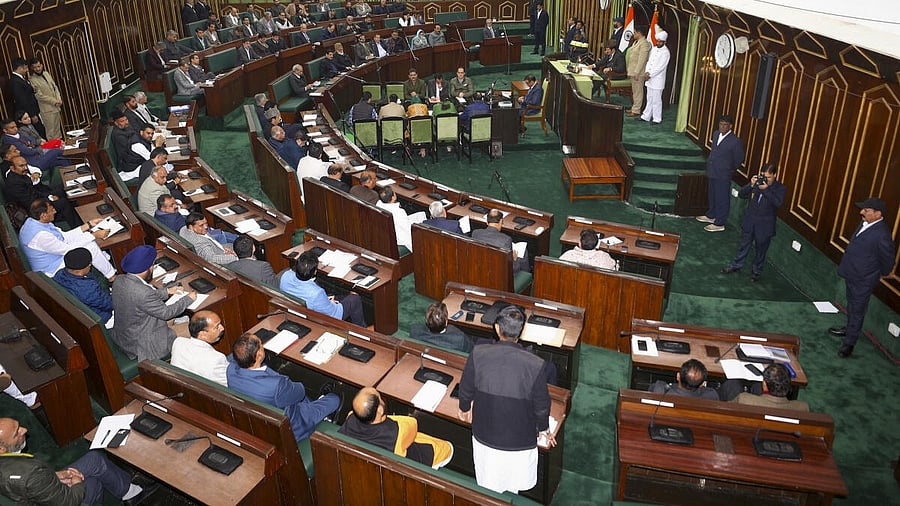
Member in the Jammu and Kashmir Legislative Assembly on the first day of its session, in Jammu, Monday, March 3, 2025.
Credit: PTI Photo
Srinagar: As first Budget session of Jammu and Kashmir Union Territory (UT) Legislative Assembly has just begun, the scope of legislative discussions appears significantly constrained, with key issues like security, public order and All India Services now falling exclusively under the jurisdiction of the Lieutenant Governor (L-G).
Prior to the abrogation of Article 370 and J&K Reorganisation Act-2019, the bicameral legislature of Jammu and Kashmir, which included both the Legislative Assembly and the Legislative Council, operated under the J&K Constitution, granting it authority over a wide range of domains, including the Home portfolio.
However, this autonomy has drastically shifted within the UT. The ongoing Assembly session, closely watched by political analysts and observers, follows a series of amendments to the Jammu and Kashmir Reorganisation Act of 2019, as well as changes to the Transaction of Business Rules, which have effectively centralised power under the L-G.
In January, Assembly Speaker Abdul Rahim Rather of the ruling National Conference (NC) party formed a 9-member committee to finalise the draft Rules of Procedure and Conduct of Business in the House. After deliberations, the Business Rules Committee reached a consensus on February 11, approving minor modifications to the procedural rules for conducting Assembly business.
Legislators are no longer allowed to raise discussions or introduce bills concerning these critical areas, which were once within the purview of the state government. The restriction has raised concerns among local parties, who have questioned the diminishing autonomy of the Union Territory’s legislative body.
CPM leader M Y Tarigami, a five time MLA, believes amendment in business rules has ‘diminished’ the role of legislature. “The elected government will not be able to reply to the questions on these domains as it has been divested of the authority of those subjects,” he told DH.
Peoples Democratic Party (PDP) legislator Waheed Parra accused the Business Rules Committee of a “historic betrayal” and “ratification” of the decisions about J&K made by the Union government on August 5, 2019.
“The current J&K Assembly may be weak, but the Business Rules pushed through it are a historic betrayal to the people of J&K and to the J&K Constitution, which has already been erased,” Parra said.
A political analyst said the Lieutenant Governor’s powers have been significantly enhanced, and now the Assembly is rendered powerless on key issues. “The role of the Legislative Assembly is now mostly symbolic,” he remarked.
“The limitations on debate over crucial topics are likely to continue to cast a shadow over the Assembly’s ability to function as a forum for comprehensive dialogue,” he added.
For the people of Jammu and Kashmir, these changes represent a stark departure from the pre-2019 era when the erstwhile state enjoyed a degree of autonomy. While the UT Assembly remains operational, its reduced authority raises significant questions about its capacity to address the region’s pressing concerns and local issues effectively.